Overview
Semaglutide may assist in managing the symptoms of Polycystic Ovary Syndrome (PCOS) by promoting weight loss and enhancing metabolic factors, such as insulin sensitivity. Clinical trials have demonstrated significant weight loss among participants using semaglutide, indicating its potential as an effective treatment option for women with PCOS. Furthermore, it is crucial for individuals to consult healthcare providers to develop personalized treatment plans and monitor any potential side effects.
Introduction
Polycystic Ovary Syndrome (PCOS) impacts a considerable number of women, often resulting in a range of challenging symptoms that can interfere with daily life and long-term health. Ongoing research is investigating innovative treatment options, and semaglutide has surfaced as a promising candidate for managing PCOS symptoms and enhancing overall well-being.
Nevertheless, a critical question persists: does semaglutide genuinely deliver the relief and outcomes that women with PCOS desire, or are there underlying challenges that must be addressed?
This article examines the effectiveness of semaglutide for PCOS, guiding readers through essential steps to assess its potential benefits and suitability for their individual health journeys.
Understand PCOS and Its Symptoms
Polycystic Ovary Syndrome (PCOS) is a prevalent hormonal condition affecting approximately 10% of women during their reproductive years. This condition is characterized by symptoms such as:
- Irregular menstrual cycles
- Excessive hair growth (hirsutism)
- Acne
- Weight gain
All of which can significantly impact a woman’s quality of life. Recognizing these symptoms is essential, as they may signify an underlying hormonal imbalance that can be addressed through medical intervention. Research shows that many cases of PCOS remain undetected, highlighting the critical need for early identification and management.
Women who actively manage their symptoms often report increased confidence and energy levels, demonstrating the transformative potential of timely intervention. Furthermore, it is important to note that PCOS is associated with long-term health risks, including a heightened risk of diabetes and cardiovascular issues. By understanding and recognizing these symptoms, women can take proactive steps toward reclaiming their health.
Treatment options such as semaglutide are currently being studied to evaluate whether does semaglutide help with PCOS in managing body composition and hormonal balance.
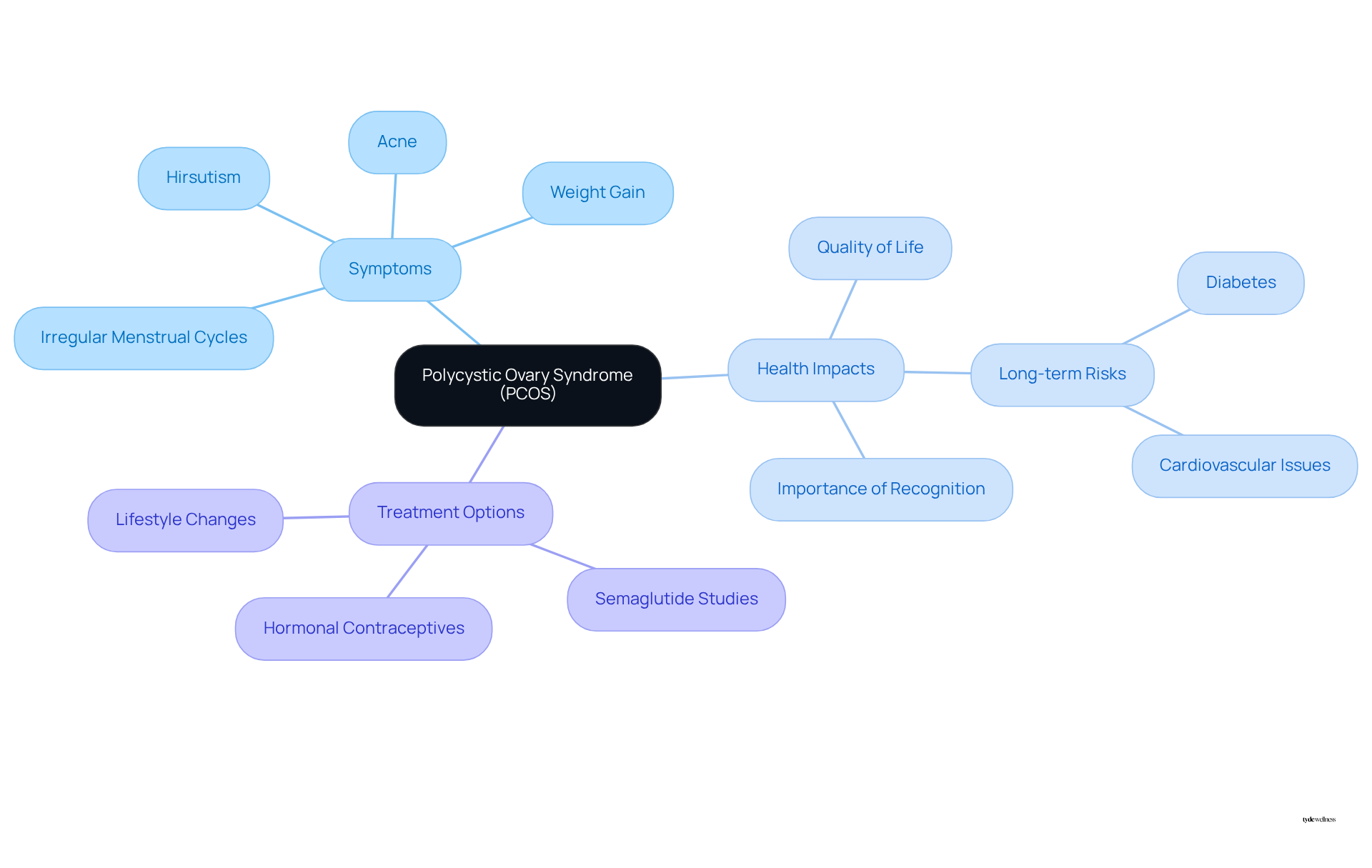
Learn About Semaglutide and Its Mechanism
Semaglutide is a glucagon-like peptide-1 (GLP-1) receptor agonist that mimics a hormone involved in appetite regulation and insulin secretion. Its operation involves improving insulin sensitivity, decreasing appetite, and slowing gastric emptying, which can lead to significant fat loss.
For women with polycystic ovary syndrome (PCOS), a common question is whether semaglutide helps with PCOS, as managing body mass is crucial since excess weight can exacerbate symptoms and hormonal imbalances. Research indicates that the question of whether semaglutide helps with PCOS is answered positively, as it can aid in reducing body mass and improving metabolic factors, such as insulin sensitivity, in women, positioning it as a promising treatment option.
Clinical trials have shown that participants experienced substantial weight loss, with some achieving reductions exceeding 20-25% within a year, particularly among those enrolled in Tyde Wellness programs. Additionally, patients using semaglutide reported more than double the weight loss compared to those on a placebo, underscoring its effectiveness.
While the medication offers significant advantages, it is essential to acknowledge that gastrointestinal symptoms, such as nausea, are common side effects associated with its use. Overall, a notable advancement in the therapeutic options available for women confronting the challenges of PCOS is whether semaglutide helps with PCOS.
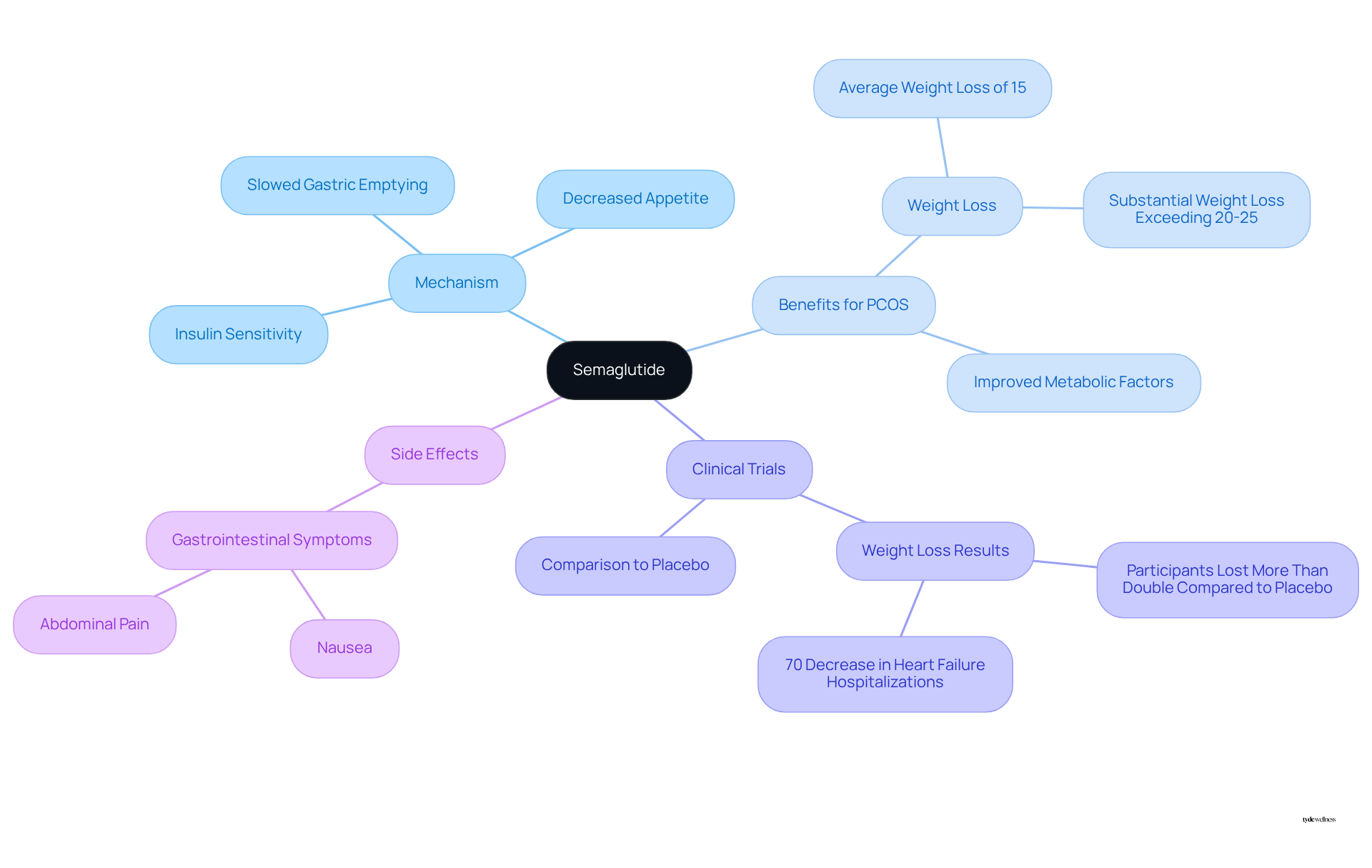
Evaluate Your Eligibility for Semaglutide Treatment
To assess your suitability for this treatment, consider the following criteria:
- A body mass index (BMI) of 30 or greater, or
- A BMI of 27 or more with at least one weight-related health issue, such as type 2 diabetes or hypertension.
It is also important to note that this medication is not recommended for individuals with diabetic retinopathy or pancreatic and kidney problems. Furthermore, discuss any current health concerns with your healthcare provider, as specific conditions may influence your appropriateness for the treatment.
Understanding these standards is crucial for making informed choices regarding your therapy options, especially considering that approximately 137 million adults in the U.S. are eligible for this medication, which represents more than half of the adult population. The mean age of those eligible is about 50 years, highlighting the demographic that may be affected by these criteria.
In addition, the cost of the medication is a significant factor for many people seeking treatment, with Wegovy priced around $1,350 monthly and Ozempic at about $900.
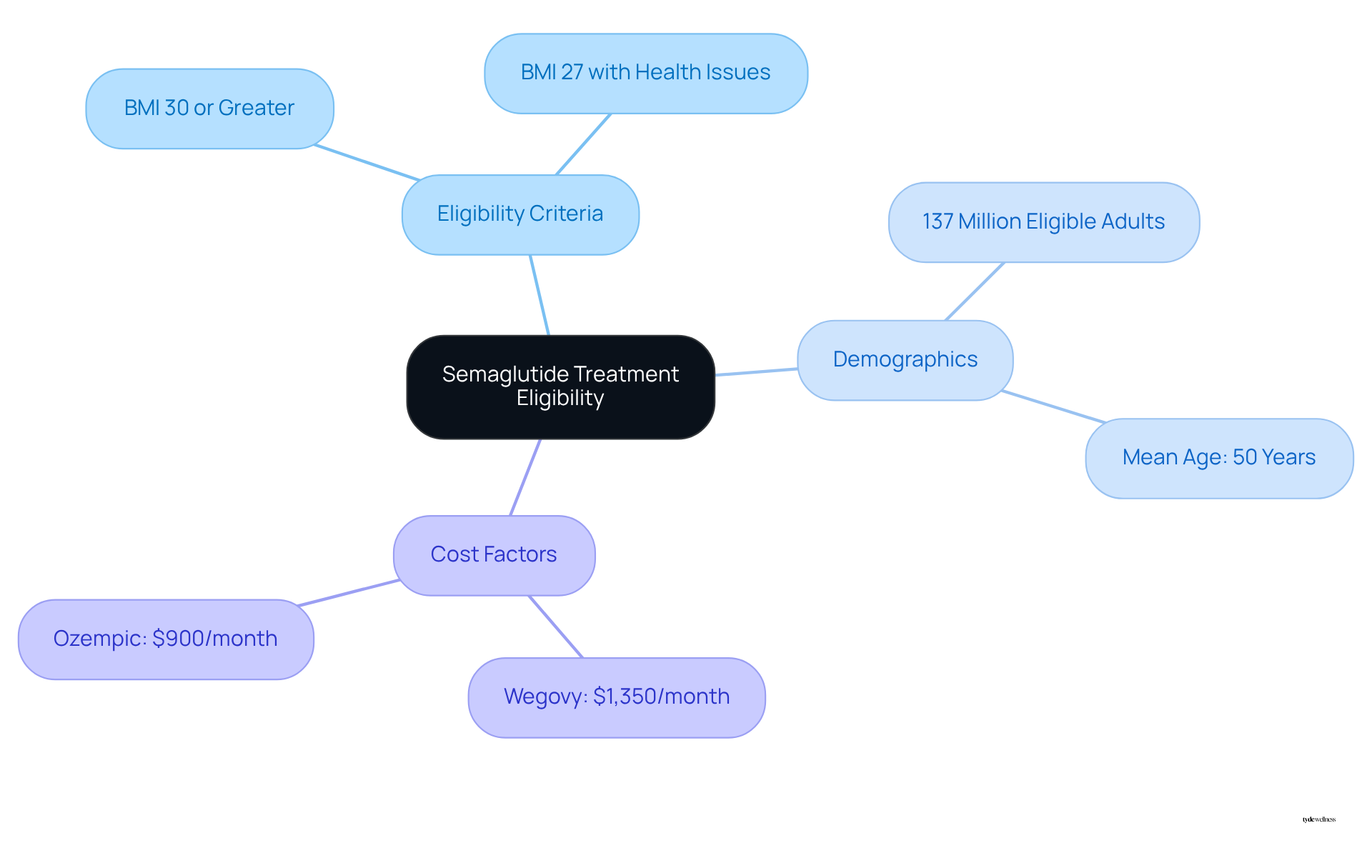
Consult with Your Healthcare Provider for Personalized Guidance
Consulting with your healthcare provider before initiating medication is essential for ensuring a personalized approach to your weight loss journey, particularly for women dealing with conditions like PCOS, as many wonder if semaglutide helps with PCOS. During this consultation, your provider will evaluate your medical history, current medications, and overall health to determine if semaglutide is appropriate for you.
Studies indicate that adults with obesity shed an average of 15% of their body mass after using Wegovy for one year and four months, underscoring the potential efficacy of this intervention. To maximize your appointment, compile a list of your symptoms, any prior therapies you’ve experienced, and your specific goals for weight loss. Open dialogue will facilitate the development of a personalized treatment plan that aligns with your unique health needs.
Furthermore, ongoing medical supervision is crucial for managing GLP-1 medications and addressing any potential side effects, such as gastrointestinal issues, which are common among new users. By prioritizing personalized care and understanding the potential costs associated with brand-name medications versus compounded alternatives, you can navigate your weight loss journey more effectively while considering whether semaglutide helps with PCOS.
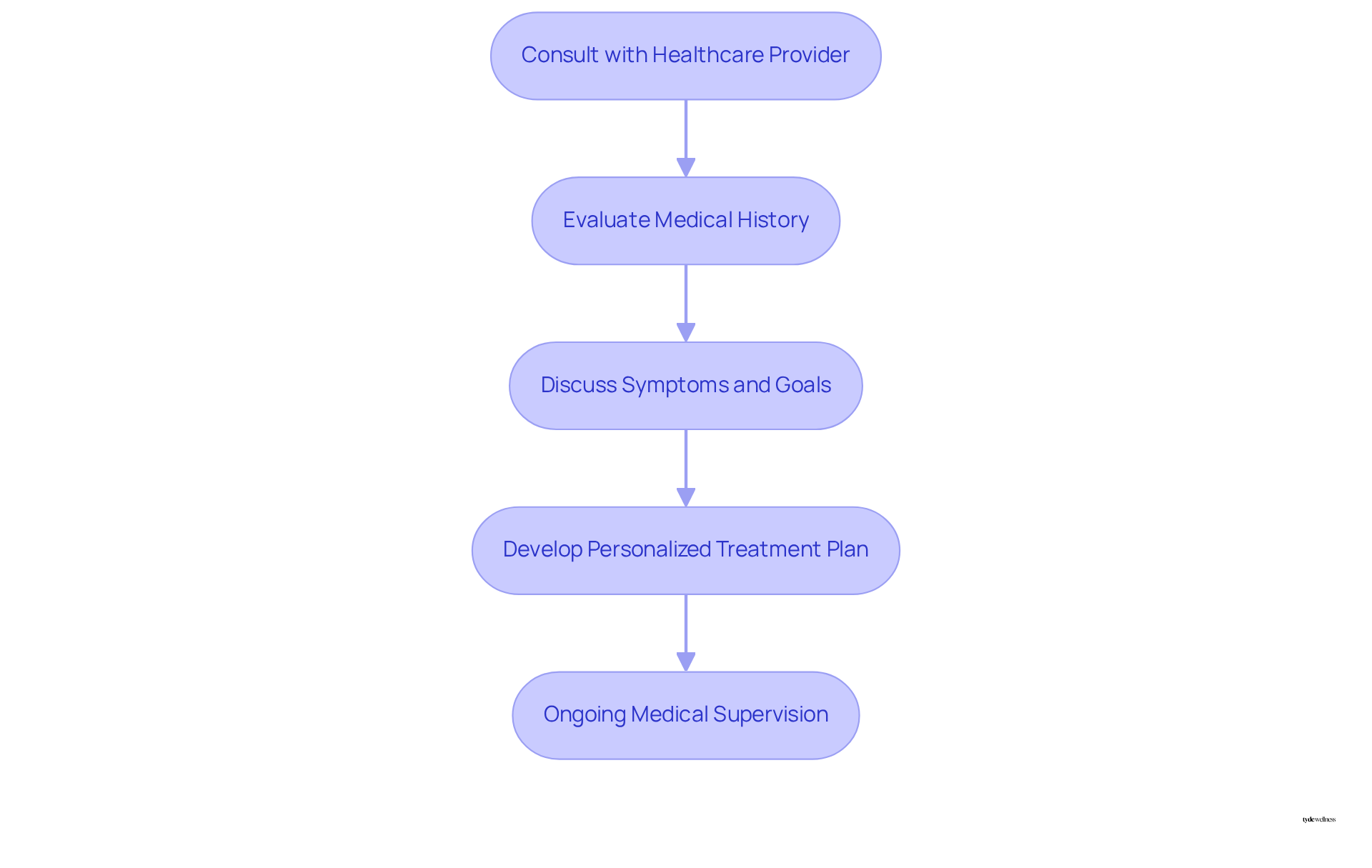
Consider Side Effects and Safety Precautions
Semaglutide is generally well-tolerated; however, awareness of potential side effects is essential. Common side effects may include:
- Nausea
- Vomiting
- Diarrhea
- Abdominal pain
More serious, albeit rare, risks include:
- Pancreatitis
- Thyroid tumors
Recent studies indicate that patients using GLP-1 medications, including semaglutide, have reported over 6,700 cases of acute pancreatitis from 2005 to 2023, with a notable increase in risk within 30 days of exposure, as evidenced by a study involving 1,269 hospitalized cases. Furthermore, there is a potential connection between semaglutide and non-arteritic anterior ischemic optic neuropathy (NAION), a rare eye condition that may result in vision loss.
It is crucial to discuss these risks with your healthcare provider, who can help you evaluate the benefits against potential dangers. Continuous health monitoring during treatment is vital; any concerning symptoms, such as severe abdominal pain or sudden changes in vision, should be reported immediately to your provider. Current studies indicate that although the long-term safety profile of semaglutide is still under assessment, healthcare providers are typically at ease prescribing it for weight loss management with careful observation. This proactive approach ensures that patients can safely navigate their weight loss journey while minimizing risks. Moreover, it is recommended that semaglutide be used only under strict healthcare supervision to ensure patient safety.
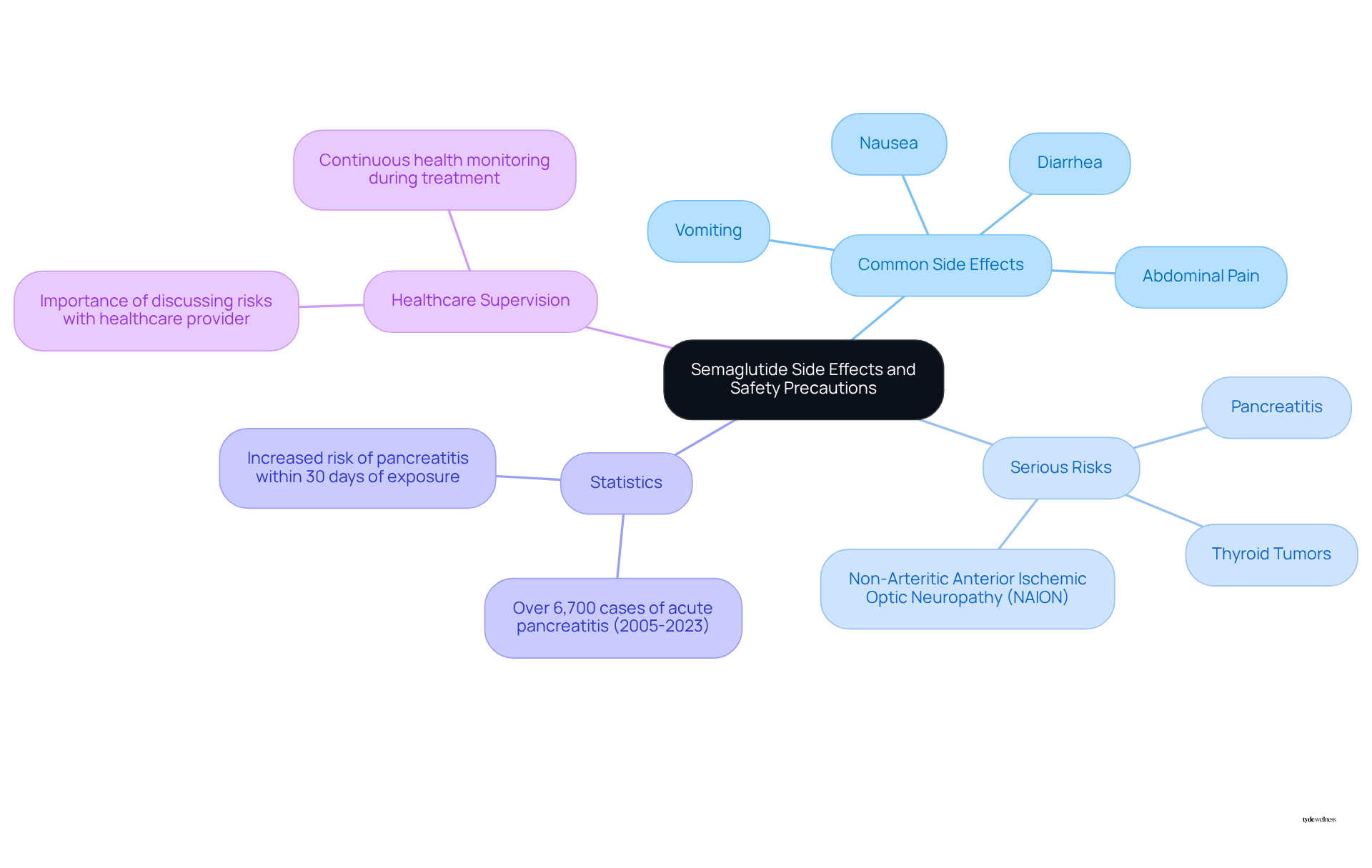
Conclusion
Understanding the potential benefits of semaglutide in managing Polycystic Ovary Syndrome (PCOS) is essential for women seeking effective treatment options. This guide has explored how semaglutide, a GLP-1 receptor agonist, may assist in alleviating symptoms associated with PCOS, particularly regarding weight management and insulin sensitivity. Recognizing the significance of early intervention and informed treatment choices allows women to take proactive steps toward improving their health and quality of life.
Key insights from the article highlight:
- The prevalence of PCOS and its symptoms
- The mechanism of action of semaglutide
- The criteria for determining eligibility for treatment
Furthermore, understanding the potential side effects and the importance of consulting with healthcare providers ensures that individuals can make educated decisions about their treatment plans. Semaglutide has shown promise in clinical trials, providing substantial weight loss and improved metabolic factors, which are crucial for women affected by PCOS.
Ultimately, the journey toward effectively managing PCOS involves collaboration with healthcare professionals and a personalized approach to treatment. As research continues to evolve, staying informed about the latest findings and treatment guidelines is vital. Women are encouraged to engage in open discussions with their healthcare providers about the potential of semaglutide and other treatment options, ensuring they receive the most appropriate care tailored to their unique health needs.
Frequently Asked Questions
What is Polycystic Ovary Syndrome (PCOS)?
Polycystic Ovary Syndrome (PCOS) is a hormonal condition affecting approximately 10% of women during their reproductive years, characterized by symptoms such as irregular menstrual cycles, excessive hair growth (hirsutism), acne, and weight gain.
What are the common symptoms of PCOS?
Common symptoms of PCOS include irregular menstrual cycles, excessive hair growth, acne, and weight gain.
Why is it important to recognize the symptoms of PCOS?
Recognizing the symptoms of PCOS is essential as they may indicate an underlying hormonal imbalance that can be addressed through medical intervention. Early identification and management are critical since many cases of PCOS remain undetected.
What long-term health risks are associated with PCOS?
PCOS is associated with long-term health risks, including a heightened risk of diabetes and cardiovascular issues.
How can women manage the symptoms of PCOS?
Women who actively manage their symptoms often report increased confidence and energy levels, demonstrating the transformative potential of timely intervention.
What is semaglutide and how does it work?
Semaglutide is a glucagon-like peptide-1 (GLP-1) receptor agonist that mimics a hormone involved in appetite regulation and insulin secretion, improving insulin sensitivity, decreasing appetite, and slowing gastric emptying, which can lead to significant fat loss.
Does semaglutide help with managing PCOS?
Yes, research indicates that semaglutide can aid in reducing body mass and improving metabolic factors, such as insulin sensitivity, in women with PCOS, making it a promising treatment option.
What results have clinical trials shown regarding semaglutide?
Clinical trials have shown that participants experienced substantial weight loss, with some achieving reductions exceeding 20-25% within a year, especially among those enrolled in Tyde Wellness programs. Patients using semaglutide reported more than double the weight loss compared to those on a placebo.
What are the common side effects of semaglutide?
Common side effects associated with semaglutide include gastrointestinal symptoms, such as nausea.
List of Sources
- Understand PCOS and Its Symptoms
- Semaglutide Shows Promise for PCOS Symptoms (https://childrenscolorado.org/advances-answers/recent-articles/pcos-semaglutide-research)
- New research could change how we treat PCOS (https://answers.childrenshospital.org/rethinking-polycystic-ovary-syndrome)
- Polycystic Ovary Syndrome News, Articles and Research (https://news-medical.net/condition/Polycystic-Ovary-Syndrome)
- PCOS symptoms are still difficult for doctors to diagnose and treat. Here’s why. (https://nbcnews.com/health/womens-health/pcos-diagnosis-treatment-difficult-women-rcna142430)
- The invisible toll of life with polycystic ovary syndrome (https://theguardian.com/wellness/article/2024/sep/03/pcos-effects-mental-health)
- Learn About Semaglutide and Its Mechanism
- An analysis of national news coverage of semaglutide for weight loss (https://sciencedirect.com/science/article/abs/pii/S1544319124003285)
- Weight Loss Drug Shows Benefits for Heart Failure – News Center (https://news.feinberg.northwestern.edu/2024/05/08/weight-loss-drug-shows-benefits-for-heart-failure)
- Semaglutide News, Articles and Research (https://news-medical.net/condition/Semaglutide)
- Head-to-Head Trial Compares Weight Loss Drugs (https://news.weill.cornell.edu/news/2025/05/head-to-head-trial-compares-weight-loss-drugs)
- ‘Weight loss’ drug semaglutide linked to better heart health (https://ucl.ac.uk/news/2024/may/weight-loss-drug-semaglutide-linked-better-heart-health)
- Evaluate Your Eligibility for Semaglutide Treatment
- Are You Eligible for Ozempic? New Study Suggests Over Half of U.S. Adults Qualify (https://health.com/ozempic-semaglutide-american-eligibility-8747341)
- AHA: Half of U.S. Adults Are Eligible for Treatment With Semaglutide – Drugs.com MedNews (https://drugs.com/news/aha-u-s-adults-eligible-semaglutide-122519.html)
- More than half of all US adults are eligible for semaglutide therapy (https://news-medical.net/news/20241120/More-than-half-of-all-US-adults-are-eligible-for-semaglutide-therapy.aspx)
- AHA: Half of US Adults Are Eligible for Treatment With Semaglutide (https://gastroenterologyadvisor.com/news/aha-half-of-us-adults-are-eligible-for-treatment-with-semaglutide)
- JAMA Cardiology Letter Highlights Limitations and Risks of Semaglutide (https://pcrm.org/news/news-releases/jama-cardiology-letter-highlights-limitations-and-risks-semaglutide)
- Consult with Your Healthcare Provider for Personalized Guidance
- Weight Watchers Stopped Semaglutide – Still Available Here (https://alturasmedicalweightloss.com/weight-watchers-stopped-semaglutide-where-to-get-it-now)
- Study Finds GLP-1s May Be Linked to Serious Eye Disease. What To Know (https://today.com/health/diet-fitness/is-ozempic-safe-rcna183494)
- Compounded semaglutide is an ill-defined public health crisis (https://statnews.com/2024/09/13/compounded-semaglutide-online-pharmacies-wegovy-ozempic)
- What to know about GLP-1 supplements for weight loss (https://nbcnews.com/health/health-news/glp-1-supplements-weight-loss-science-what-know-rcna201921)
- Semaglutide, also known as Ozempic, for weight loss – what you need to know (https://uclahealth.org/news/article/semaglutide-weight-loss-what-you-need-know)
- Consider Side Effects and Safety Precautions
- Potentially fatal side effect of weight-loss drugs sparks new investigation (https://nypost.com/2025/07/06/health/potentially-fatal-side-effect-of-weight-loss-drugs-sparks-new-investigation)
- PRAC concludes eye condition NAION is a very rare side effect of semaglutide medicines Ozempic, Rybelsus and Wegovy | European Medicines Agency (EMA) (https://ema.europa.eu/en/news/prac-concludes-eye-condition-naion-very-rare-side-effect-semaglutide-medicines-ozempic-rybelsus-wegovy)
- Study Finds GLP-1s May Be Linked to Serious Eye Disease. What To Know (https://today.com/health/diet-fitness/is-ozempic-safe-rcna183494)
- Harvard and CDC study: Serious side effects from semaglutide are uncommon – Harvard Health (https://health.harvard.edu/staying-healthy/harvard-and-cdc-study-serious-side-effects-from-semaglutide-are-uncommon)



